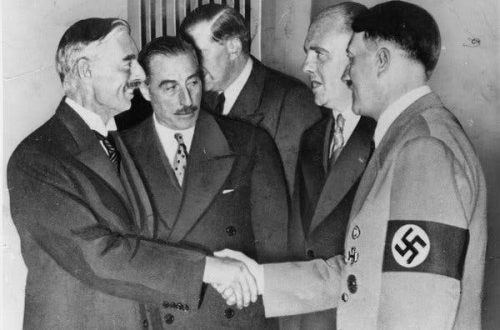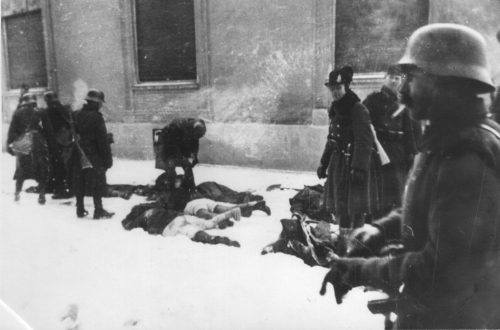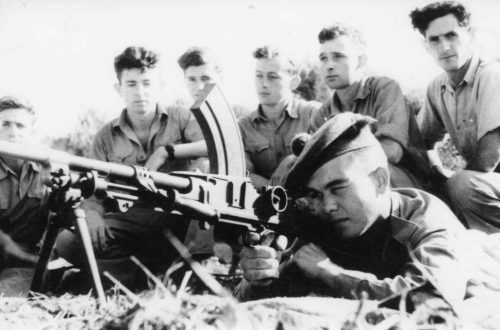Guest post by Sackcloth & Ashes
Seventy years ago today, the Polish Home Army (the Armia Krajowa, or AK) launched Operation Tempest, a bold if not desperate attempt to seize control of Warsaw as the Wehrmacht retreated from the Soviets. As we all know, Tempest ended in tragedy. For two months the AK and the citizens of Warsaw fought a desperate battle against overwhelming odds, fighting a barbarous adversary that responded with indiscriminate bombing and shelling of the city, and repeated massacres of the civilian population. Up to 200,000 Poles were killed between 1st August and 2nd October 1944, when the AK finally surrendered. Warsaw itself was razed to the ground on Adolf Hitler’s orders. Norman Davies’s account of the rising is an authoritative and moving one, highly recommended to HP readers.
As we know, the defeat of the AK and the destruction of Warsaw were facilitated by the Soviets. The Red Army’s halt outside the capital in early August 1944 may have been due to a combination of military factors – the culmination of the offensive that took Soviet troops from Belarus to the banks of the Vistula River, and a bolstering of German defences in Central Poland. Yet it is evident that Josif Stalin saw the opportunity to let the Nazis destroy the AK, removing an impediment to the imposition of Communist rule on the Poles. And so not only did the Soviets remain passive as Warsaw burned, but they also vetoed American and British requests to assist air drops of arms and ammunition to the resistance by their air forces. As the Poles fought for their lives, the Soviet Marshal Konstantin Rokossovsky (who was in fact a Varsovian by birth) contemptuously compared the AK to a ‘clown in the circus who pops up at the wrong moment’.[1] In Soviet mythology – and in the propaganda of the Polish Communist regime – the insurgents were denigrated as reckless gamblers who had launched a ‘premature’ uprising.
The Nazis ended their brutal occupation of Poland with one more atrocity to disfigure the country and hamper its post-war reconstruction. The Soviets were their accomplices. I would be surprised if either Socialist Unity or the Guardian acknowledges this fact.
The AK High Command launched Tempest because it was the last opportunity to assert Poland’s independence against its two totalitarian enemies. Halik Kochanski’s excellent history of Poland in the Second World War highlights the reasons why: the Molotov-Ribbentrop Pact, the Katyn massacre, and Stalin’s promotion of a puppet regime at the expense of the legitimate government in exile in London. As the Soviets advanced westwards they annexed the land they had gained in 1939 thanks to their deal with Nazi Germany, and the NKVD and the Polish Communists were already liquidating AK units in the field, despite the fact that they were supposedly allies.
Between the 5th and the 13th July 1944 around 10,000 of its soldiers under the command of Lieutenant-Colonel Aleksander Krzyzanowski (‘Wilk’) helped the Red Army capture Vilnius. The NKVD showed its gratitude by arresting ‘Wilk’ and 70 of his officers, deporting them to the USSR.[2] At about the same time Colonel Wladyslaw Filipkowski (‘Janka’) seized L’viv from the retreating Germans with a force of 3,000. He was invited along with 30 subordinates to a ‘conference’ with Marshal Ivan Koniev on 31st July, and all were arrested as ‘criminals and Polish fascists’.[3] The AK fighters in Warsaw had no illusions as to what would await them if they simply stood aside and let the Soviets take the capital. Jozef Szczepanski, one of their number, expressed their plight – and Poland’s as a whole – in verse:
We’re waiting for you, red plague
To save us all from the black death:
Waiting for a salvation
To be welcomed with disgust
By a country that’s already been hanged and quartered.[4]
‘Liberation’ was a sick joke for post-war Poland, as the war’s end merely saw the replacement of one despotic system imposed by foreign conquest with another.[5] However, Szczepanski still predicted that one day his country would be truly free.
From our graves
A new triumphant Poland will be born.
And it won’t be you, red tyrant
Depraved power, that rules the land.[6]
Seventy years on, Poland is now the type of country the AK fought and bled for. It is prosperous, democratic, peaceful, and a NATO and EU member. And on a day like this, it is fitting to remember the insurgents and civilians killed because of Nazi savagery, and Soviet treachery. It is appropriate to remember that they died ‘for your freedom, and for ours’, and to celebrate the ultimate defeat of their persecutors and the fulfilment of Szczepanski’s dream of genuine liberation.
[1] Alexander Werth, Russia at War: 1941-1945 (London: Barrie & Rockliff 1964), pp.876-878.
[2] Halik Kochanski, The Eagle Unbowed: Poland and the Poles in the Second World War (London: Penguin 2013), p.395.
[3] Chris Bellamy, Absolute War: Soviet Russia in the Second World War (Basingstoke: Macmillan 2007), p.617.
[4] The poem ‘We Are Waiting’ is translated in Norman Davies, Rising ’44: The Battle for Warsaw (Macmillan 2003), pp.688-689.
[5] Anne Applebaum, Iron Curtain: The Crushing of Eastern Europe (Penguin 2013), pp.106-111, pp.294-295
[6] Davies, Rising ’44, p.689.


